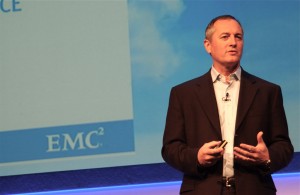The IT landscape is ever evolving as the divide between traditional business and personal consumption continues to narrow. At its Momentum 2012 conference in Vienna, EMC highlighted its rise as an innovator in consumer business and the significant influence it will have on the enterprise.
Transforming IT and business has been a familiar sound bite from EMC over the past year as it has frequently promised to assist enterprises in the transition from traditional to social IT with its solutions, support and industry knowledge.
EMC delivered on those promises during its Momentum 2012 conference in Vienna, where it presented the largest simultaneous product launch of its kind, signifying its step into secure, rapid and social business transactions.
The storage-turned-general IT company used the event to make a statement on the next generation user of business applications, which it believes will demand modern, beautiful and socially-based programmes that are available on any device and accessible from any location.
According to EMC, users will demand the types of products that they’ve experienced during their training and development. As such, its mission is to assist in the integration of business and new user, focusing on cloud computing, mobility and big data.
“Consumerisation is the future of IT,” said Rick Devenuti, President, EMC IIG. “Business is changing, it’s transforming, and we need to transform with it. The needs are greater and the demand is higher.
“Customers are experiencing shifts in the way their business works, our solutions aren’t adequate anymore. We’ve developed a range of products which the industry is going to love. They’re simplified, unified solutions which effectively address the current needs of our customers.”
In sync
The new Documentum product range includes a host of file based solutions, including document security, file sharing and slideshow capabilities. EMC also presented the latest version of the cloud-based sync and share service Syncplicity, following its acquisition of the company in May.
“This is another thing I’m excited about – syncing all my folders from my desktop into a secure environment and having access to them whenever and wherever I like. That’s the future of business. I don’t even need to carry my laptop around with me anymore,” Devenuti said.
Syncplicity allows users to access, share, and update any file, online or offline. Moreover, if an employee leaves the company, Syncplicity has the ability to hone in on specific enterprise owned data and wipe it from each device.
Jeetu Patel, General Manager, Syncplicity, said: “The enterprise is witnessing a lack of control. The employee wants to work on their chosen device and they want to access their desktop virtually.
“With Syncplicity, IT teams have full control of their data regardless to when or where it’s being accessed – that is hugely positive. This gives you full back-up protection whilst aiding productivity. The mission is to change the way people work without changing what they do and this is the perfect example of that.”
According to Patel, IT has a harder job now than ever before in terms of access and security. With the consumerisation of business, he said employees can go out and begin to use any device of their choice without even consulting with their IT management.
“Users are making life hard for IT by simply bypassing them and saying ‘I’m going to use this consumer based application, and by the way, there isn’t any security on it.’ It opens huge amounts of exposure,” he said.
“IT then has two options; they can lock down the user – causing them to be unproductive – or they can provide tools to the users which are compliant but also easy to use. Thousands of people will go into this space – we’re pioneers in this I believe.”
The two major reasons for this consumer shift are cloud and mobile. The accessibility for users has increased and the simplicity of gaining applications and tools has evolved greatly, Patel added.
“Before, if a user wanted the Microsoft Office package, there was a $300 odd price tag and they had to go to the store, pick it up and then install it – they’re not going to do that today. Now they’re looking at a two minute download, even with a slow connection,” he said.
“With this freedom for the user, the risks increase. We think this is completely mitigated by solutions like ours. We do one thing really well – files. We eliminate friction from files.”
The major concern for businesses in the consumerisation of IT and BYOD (bring your own device) is maintaining security without taking away any productivity from employees. Patel said he believes that EMC and Syncplicity offer the only solution on the market that offers the freedom that employees need to access and share files whilst giving IT peace of mind.
“With these devices, businesses don’t own the data. They don’t know where the data is, what it’s doing or where it’s going – they’re very out of control. With us, the company can access the data, control the data and monitor the data at all times. Moreover, if an employee loses their device, the sensitive data can be located and wiped instantly.”
Mitigating costs
A further benefit of consumerising IT, according to EMC, is the cost saving through the use of personal devices.
As pointed out by Patel, only a fraction of tablets used in business are bought by the company, and users who bring in cutting edge technology that supports the use of business applications is a winning formula for the company.
The advent of mobility and, as EMC announced in Vienna, a secure and protected environment with which to use it, is helping businesses move into the next phase of IT.
The key message of the event was that IT transformation is gaining momentum and it’s only a matter of time before the entire industry is board.






